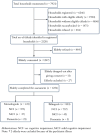Protective effect of bilingualism on aging, MCI, and dementia: A community-based study
- PMID: 38376105
- PMCID: PMC11032525
- DOI: 10.1002/alz.13702
Protective effect of bilingualism on aging, MCI, and dementia: A community-based study
Abstract
Introduction: Lifelong bilingualism is associated with a delayed age at onset of dementia, but evidence from community-based studies is limited. We investigated the relationship between bilingualism and the prevalence of cognitive impairment in a linguistically diverse community.
Methods: A door-to-door community study was conducted from January to December 2021 in urban Bengaluru, India. 1234 individuals aged ≥60 years participated in the study. Participants were diagnosed with no cognitive impairment (NCI), mild cognitive impairment (MCI), or dementia using established diagnostic criteria.
Results: Dementia prevalence was higher in monolinguals (4.9%) than bilinguals (0.4%) (P = .001). The prevalence of MCI was also higher in monolinguals (8.5%) than bilinguals (5.3%) (P = .001). The study also revealed better cognitive function in bilinguals than monolinguals with NCI, after controlling for confounding variables.
Discussion: The current study provides significant support for the protective effect of bilingualism on cognitive impairment in an urban community with extensive bilingual interactional contexts in everyday life.
Highlights: Bilingualism has been demonstrated to protect against dementia and mild cognitive impairment in a linguistically diverse community with extensive code-switching contexts. Bilingual older individuals had superior baseline cognitive performance compared to monolingual older individuals. Bilingualism was found to have an independent effect on general cognition after adjusting for major social determinants of health in the group without cognitive impairment.
Keywords: ace; aging; bilingualism; cognition; cognitive reserve; dementia; prevalence.
© 2024 The Authors. Alzheimer's & Dementia published by Wiley Periodicals LLC on behalf of Alzheimer's Association.
Conflict of interest statement
The authors declare no conflicts of interest. Author disclosures are available in the Supporting information.
Similar articles
-
Bilingualism Is Associated with a Delayed Onset of Dementia but Not with a Lower Risk of Developing it: a Systematic Review with Meta-Analyses.Neuropsychol Rev. 2020 Mar;30(1):1-24. doi: 10.1007/s11065-020-09426-8. Epub 2020 Feb 8. Neuropsychol Rev. 2020. PMID: 32036490 Free PMC article.
-
Comparative Effects of Education and Bilingualism on the Onset of Mild Cognitive Impairment.Dement Geriatr Cogn Disord. 2017;44(3-4):222-231. doi: 10.1159/000479791. Epub 2017 Sep 28. Dement Geriatr Cogn Disord. 2017. PMID: 29207387
-
Bilingualism in older Mexican-American immigrants is associated with higher scores on cognitive screening.BMC Geriatr. 2016 Nov 24;16(1):189. doi: 10.1186/s12877-016-0368-1. BMC Geriatr. 2016. PMID: 27881073 Free PMC article.
-
Impact of Bilingualism on Cognitive Outcome After Stroke.Stroke. 2016 Jan;47(1):258-61. doi: 10.1161/STROKEAHA.115.010418. Epub 2015 Nov 19. Stroke. 2016. PMID: 26585392
-
Does bilingualism contribute to cognitive reserve? Cognitive and neural perspectives.Neuropsychology. 2015 Jan;29(1):139-50. doi: 10.1037/neu0000105. Epub 2014 Jun 16. Neuropsychology. 2015. PMID: 24933492 Free PMC article. Review.
Cited by
-
Learning a Foreign Language in Older Adults Shapes the Functional Connectivity of Distinct Cerebellar Sub-Regions With Cortical Areas Rich in CB1 Receptor Expression.Brain Behav. 2025 May;15(5):e70565. doi: 10.1002/brb3.70565. Brain Behav. 2025. PMID: 40418676 Free PMC article.
References
-
- Livingston G, Huntley J, Sommerlad A, et al. Dementia prevention, intervention, and care: 2020 report of the Lancet Commission. Lancet North Am Ed. 2020;396(10248):413‐446. doi:10.1016/S0140‐6736(20)30367‐6 - DOI - PMC - PubMed
-
- Prince MJ, Wimo A, Guerchet MM, Ali GC, Wu YT, Prina M. World Alzheimer Report 2015 – The Global Impact of Dementia: An Analysis of Prevalence, Incidence, Cost and Trends. Alzheimer's Disease International; 2015.
Publication types
MeSH terms
Grants and funding
LinkOut - more resources
Full Text Sources
Medical
Miscellaneous


